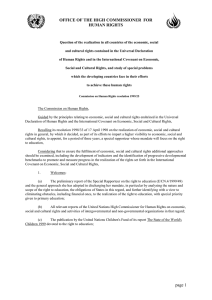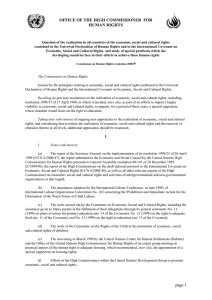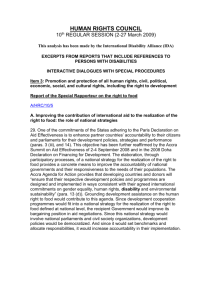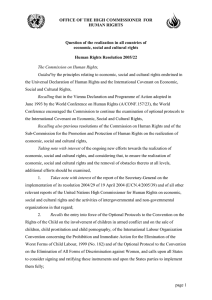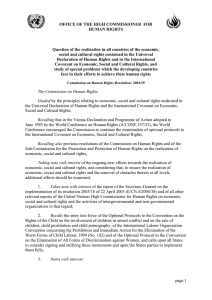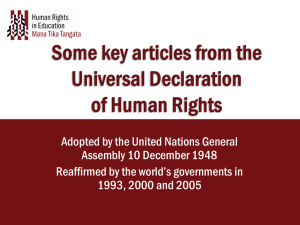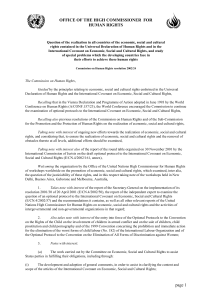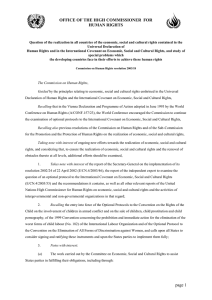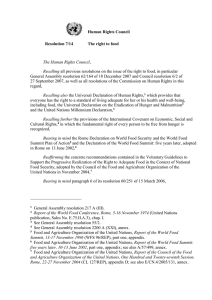OFFICE OF THE HIGH COMMISSIONER FOR HUMAN RIGHTS
advertisement
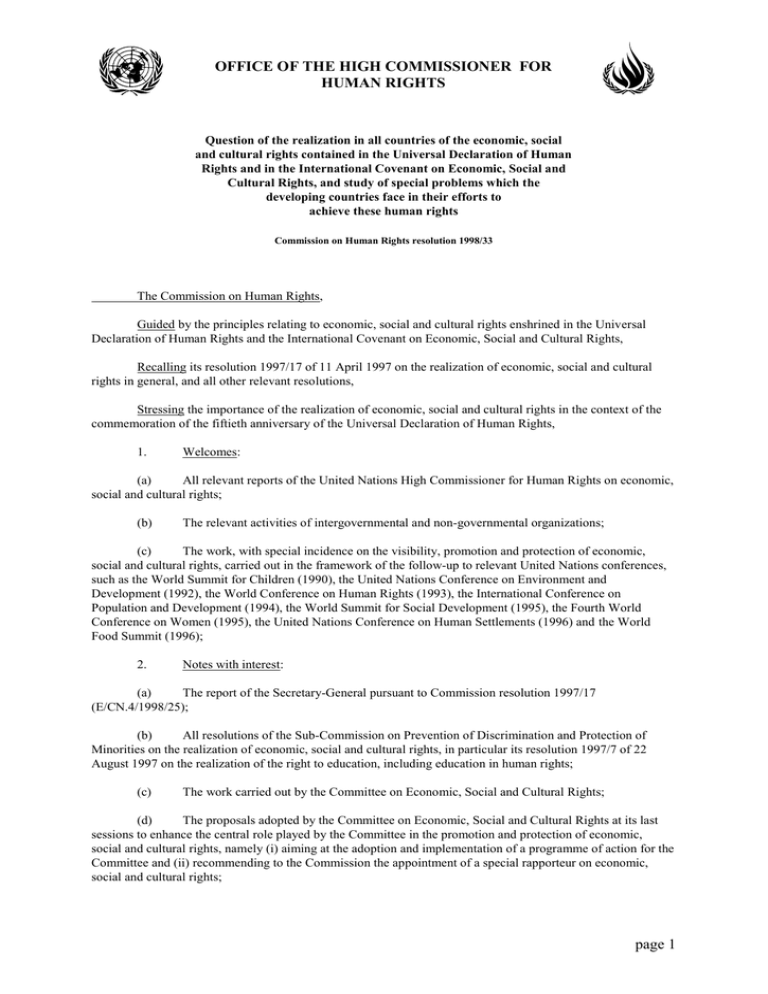
OFFICE OF THE HIGH COMMISSIONER FOR HUMAN RIGHTS Question of the realization in all countries of the economic, social and cultural rights contained in the Universal Declaration of Human Rights and in the International Covenant on Economic, Social and Cultural Rights, and study of special problems which the developing countries face in their efforts to achieve these human rights Commission on Human Rights resolution 1998/33 The Commission on Human Rights, Guided by the principles relating to economic, social and cultural rights enshrined in the Universal Declaration of Human Rights and the International Covenant on Economic, Social and Cultural Rights, Recalling its resolution 1997/17 of 11 April 1997 on the realization of economic, social and cultural rights in general, and all other relevant resolutions, Stressing the importance of the realization of economic, social and cultural rights in the context of the commemoration of the fiftieth anniversary of the Universal Declaration of Human Rights, 1. Welcomes: (a) All relevant reports of the United Nations High Commissioner for Human Rights on economic, social and cultural rights; (b) The relevant activities of intergovernmental and non-governmental organizations; (c) The work, with special incidence on the visibility, promotion and protection of economic, social and cultural rights, carried out in the framework of the follow-up to relevant United Nations conferences, such as the World Summit for Children (1990), the United Nations Conference on Environment and Development (1992), the World Conference on Human Rights (1993), the International Conference on Population and Development (1994), the World Summit for Social Development (1995), the Fourth World Conference on Women (1995), the United Nations Conference on Human Settlements (1996) and the World Food Summit (1996); 2. Notes with interest: (a) The report of the Secretary-General pursuant to Commission resolution 1997/17 (E/CN.4/1998/25); (b) All resolutions of the Sub-Commission on Prevention of Discrimination and Protection of Minorities on the realization of economic, social and cultural rights, in particular its resolution 1997/7 of 22 August 1997 on the realization of the right to education, including education in human rights; (c) The work carried out by the Committee on Economic, Social and Cultural Rights; (d) The proposals adopted by the Committee on Economic, Social and Cultural Rights at its last sessions to enhance the central role played by the Committee in the promotion and protection of economic, social and cultural rights, namely (i) aiming at the adoption and implementation of a programme of action for the Committee and (ii) recommending to the Commission the appointment of a special rapporteur on economic, social and cultural rights; page 1 (e) The recommendations adopted by the open-ended working group on structural adjustment programmes and economic, social and cultural rights; 3. Reaffirms: (a) That, in accordance with the Universal Declaration of Human Rights, the ideal of free human beings enjoying freedom from fear and want can be achieved only if conditions are created whereby everyone may enjoy his economic, social and cultural rights, as well as his civil and political rights; (b) The inextricable link between full respect for the rights contained in the International Covenant on Economic, Social and Cultural Rights and the process of development, the central purpose of which is the realization of the potentialities of the human person with the effective participation of all members of society in relevant decision-making processes as agents and beneficiaries of development, as well as with a fair distribution of its benefits; (c) That all persons in all countries are entitled to the realization of their economic, social and cultural rights, which are indispensable to their dignity and the free development of their personality; (d) The universality, indivisibility, interdependence and interrelationship of all human rights and fundamental freedoms and that promoting and protecting one category of rights should therefore never exempt or excuse States from the promotion and protection of other rights; (e) The importance of international cooperation for the promotion and protection of all human rights, including economic, social and cultural rights; (f) That the realization of all human rights and fundamental freedoms, and particularly economic, social and cultural rights, is a dynamic process and that, as is evident in today's world, a great deal remains to be accomplished; page 2 4. Calls upon all States: (a) To give full effect to the universality of economic, social and cultural rights; (b) To consider signing and ratifying, and the States parties to implement, the International Covenant on Economic, Social and Cultural Rights; (c) To secure, through national development policies and with international assistance and cooperation, full respect for economic, social and cultural rights, giving priority to the individuals, most often women and girl children, and communities living in extreme poverty and therefore most vulnerable and disadvantaged; (d) To consider in this context, as appropriate, the desirability of drawing up national action plans identifying steps to improve the situation of human rights in general with specific benchmarks designed to give effect to minimum essential levels of enjoyment of economic, social and cultural rights; (e) To promote the effective and wide participation of representatives of civil society in decision-making processes related to the promotion and protection of economic, social and cultural rights; 5. Calls upon States parties to the International Covenant on Economic, Social and Cultural Rights: (a) To submit their reports to the Committee on Economic, Social and Cultural Rights in a regular and timely manner; (b) To promote a concerted national effort to ensure the participation of representatives of all sectors of civil society in the process of preparation of their periodic reports to the Committee on Economic, Social and Cultural Rights and in the implementation of the recommendations of the Committee; 6. Decides: (a) As part of its efforts to impart a higher visibility to economic, social and cultural rights, to appoint, for a period of three years, a special rapporteur whose mandate will focus on the right to education, as laid down in article 26 of the Universal Declaration of Human Rights and in the relevant and applicable provisions of the International Covenant on Economic, Social and Cultural Rights, and would comprise the following: (i) To report on the status, throughout the world, of the progressive realization of the right to education, including access to primary education, and the difficulties encountered in the implementation of this right, taking into account information and comments received from Governments, organizations and bodies of the United Nations system, other relevant international organizations and non-governmental organizations; (ii) To promote, as appropriate, assistance to Governments in working out and adopting urgent plans of action, wherever they do not exist, to secure the progressive implementation, within a reasonable number of years, of the principle of compulsory primary education free of charge for all, bearing in mind, inter alia, levels of development, the magnitude of the challenge and efforts by Governments; (iii) To take into account gender considerations, in particular the situation and needs of the girl child, and to promote the elimination of all forms of discrimination in education; (iv) To make his or her reports available to the Commission on the Status of Women whenever they concern the situation of women in the field of the right to education; page 3 (v) To develop a regular dialogue and discuss possible areas of collaboration with relevant United Nations bodies, specialized agencies and international organizations in the field of education, inter alia the United Nations Educational, Scientific and Cultural Organization, the United Nations Children's Fund, the United Nations Conference on Trade and Development and the United Nations Development Programme, and with international financial institutions, such as the World Bank; (vi) To identify possible types and sources of financing for advisory services and technical cooperation in the field of access to primary education; (vii)To ensure, to the extent possible, coordination and complementarity with the work carried out in the framework of Sub-Commission resolution 1997/7, in particular the working paper on the right to education to be prepared by Mr. Mustapha Mehedi; (viii) To submit to the Commission on Human Rights, beginning at its fifty-fifth session, a report covering the activities relating to this mandate; (b) To invite the United Nations Children's Fund and the United Nations Educational, Scientific and Cultural Organization to submit to the Commission on Human Rights information pertaining to their activities in promoting primary education, with specific reference to women and girls; (c) To request the High Commissioner for Human Rights to urge all States parties to the International Covenant on Economic, Social and Cultural Rights to submit their comments on the report by the Committee on Economic, Social and Cultural Rights to the Commission on a draft optional protocol for the consideration of communications in relation to the Covenant (E/CN.4/1997/105, annex); (d) To support the efforts carried out by the High Commissioner for Human Rights to implement the proposed programme of action designed to enhance the ability of the Committee on Economic, Social and Cultural Rights to assist interested Governments in their reporting obligations and its capacity to process and follow up the examination of States' reports and, accordingly, to request States parties to the International Covenant on Economic, Social and Cultural Rights to make voluntary financial contributions to ensure the adequate implementation of that programme of action; 7. Requests the Secretary-General to provide the Special Rapporteur with all the assistance necessary for the execution of his mandate; 8. Recommends the following draft decision to the Economic and Social Council for adoption: "Question of the realization in all countries of the economic, social and cultural rights contained in the Universal Declaration of Human Rights and in the International Covenant on Economic, Social and Cultural Rights, and study of special problems which the developing countries face in their efforts to achieve these human rights The Economic and Social Council, taking note of Commission on Human Rights resolution 1998/33 of 17 April 1998, authorizes the Commission, as part of its efforts to impart a higher visibility to economic, social and cultural rights, to appoint, for a period of three years, a special rapporteur whose mandate will focus on the right to education as laid down in article 26 of the Universal Declaration of Human Rights and will comprise the tasks enumerated in paragraph 6 (a) (i) to (viii) of resolution 1998/33. The Council requests the Secretary-General to provide the Special Rapporteur with all the assistance necessary for the execution of his mandate." 51st meeting page 4 17 April 1998 [Adopted by 52 votes to 1. See chap. V.] page 5
